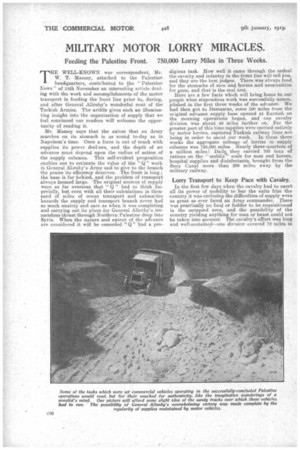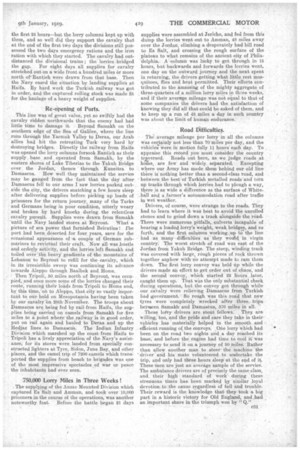MILITARY MOTOR LORRY MIRACLES.
Page 10

Page 11

If you've noticed an error in this article please click here to report it so we can fix it.
Feeding the Palestine Front. 750,000 Lorry Miles in Three Weeks.
THE WELL-KNOWN war correspondent, Mr. W. T. Massey, attached to the Palestine headquarters, contributed to the "Palestine News" of lath November an interesting article dealing with the work and accomplishments of the motor transport in feeding the front line prior to, during, and after General Allenby's wonderful rout of the Turkish Armies. The article gives such an illuminating insight into the organization of supply that we feel convinced our readers will welcome the oppor tunity of reading it. , Mr. Massey says that the axiom that an Army marches on its stomach is as sound to-day as in Napoleon's time. Once a force is out of touch with supplies its power dechnes, and the depth of an advance must depend upon the radius of action of the supply columns. This self-evident proposition enables one to estimate the Value of the "Q" work in General Ahenby's Army and to give to the branch the praise its efficiency deserves. The front is long ; the base is far behind, and the problem of transport always loomed large. The original sources of supply were so far overseas that " Q " had to think Imperially, but even with all their calculations in thousand of miles of ocean transport and submarine hazards the supply and transport branch never had so much anxiety and care as when it was completing and carrying out its plans ior General Allenby's tremendous thrust through Northern Palestine deep into Syria. When the nature and extent of the advance are considered it will be conceded "Q" had a. pro digious task. How well it came through the ordeal the cavalry and infantry in the front line will tell you, and they are the best judges. There was always food for the stomachs of men and horses and ammunition for guns, and that is the real test. Here are a few facts which will bring home to our people what stupendous work was successfully accoin. plished in the first three weeks of the advance. We had then got to Damascus, some 190 miles trona the original advance supply base opened at Rantieh on the morning operations began, and one cavalry division was about 40 miles farther on. For the greater part of this time supplies were carried entirely by motor lorries, captured Turkish railway lines not being in order to assist our work. In these three weeks the aggregate mileage of lorries in supply columns was 720,000 miles. Nearly three-quarters of a million miles! Daily they carried 700 tons of rations on the " mobile" scale for man and horses, hospital supplies and disinfectants, brought from the Suez Canal more than 200 miles away by the military railway.
Lorry Transport to Keep Pace with Cavalry.
In the first few days when the cavalry had to exert all its power of mobility to bar the exits frim the country it was enclosing the difficulties of supply were as great as ever faced an Army commander. There was practically no food or fodder to be requisitioned in the occupied area, and the possibility of the country yielding anything for man or beast could not be taken into account. The cavalry's effort was long and well-sustained—one division covered 72 miles in the first 24 hours—but the lorry columns kept up with them, and so well did they support the cavalry that at the end of the first two days the divisions still possessed the two days emergency rations and the iron ration with which they started. The cavalry had outdistanced the divisional trains ; the lorries bridged the gap. For eight days all supplies for cavalry stretched out on a wide front a hundred miles or more north ofeRantieh were drawn from that base. Then the Navy eased the situation by landing supplies at Haifa. By hard work the Turkish railway was got in order, and the captured rolling stock was made fit for the haulage of a heavy weight of supplies.
Re-Opening of Ports. •
This line was of great value, yet so swiftly had the cavalry ridden northwards that the enemy had had little time to damage it. Beyond Samakh on the southern edge of the Sea of Galilee, where the line runs through the Yarmuk Valley to Deraa, our Arab allies had hit the retreating Turk very hard by destroying bridges. Directly the railway from Haifa was opened the lorry columns forsook Rantieh as their supply base and operated from Samakh, by the eastern shores of Lake Tiberias to the Yakub Bridge over the Jordan, thence through Kuneitra to Damascus. How well they maintained the service may be gauged from the -fact that the day after Damascus fell to our arms I saw lorries parked outside the city, the drivers snatching a, few hours sleep after delivering supplies before picking up loads of prisoners for the return journey, many of the Turks and Germans being in poor condition, utterly weary and broken by hard knocks during the relentless cavalry pursuit. Supplies were drawn from Samakh -until the Navy landed stores at Beyrout. What a picture of sea power that furnished Beirutins I fhe port had been deserted for four, years, save for the occasional appearance of it couple of German submarines to revictual their eraft. Now all was bustle and orderly activity, and the lorries left Samakh and toiled over the heavy gradients of the mountains of Lebanon to Beyrout to refill for the cavalry, which in its irresistible sweep was continuing its advance towards Aleppo through Baalbek and Hams.
Then Tripoli, 50 miles north of Beyrout, was occupied, and once mom some of the lorries changed their route, running their loads from Tripoli to Horns and, by this time, on to Aleppo, that city so vastly important to our hold on Mesopotamia, having been taken by our cavalry 'Cie 28th November. The troops about Damascus are being fed by eail.from Haifa, the supplies being carried on camels from Samakh for five miles to a point where the railway is in good order, put on. rail again and hauled to Deraa and up the Hedjaz lines to Damascus. The Indian Infantry Division which marched up the coast from Haifa to Tripoli has a lively appreciation of the Navy's assistance, for its stores were, landed from specially constructed lighters at Tyre, Sidon, June Bay, and other places, and the camel trip of 7200 camels which transported the supplies from beach to•brigades was one of the most impressive spectacles of war or peace the inhabitants had ever seen.
750,000 Lorry Miles in Three Weeks
The supplying of the Anzac Mounted Division which captured Es Salt and Amman, and •took over 10,000 prisoners in the course of the operations, was another noteworthy feat. Before the battle began 21 days supplies were assembled at Jericho, and fed from this duMp the lorries went out to Amman, 43 miles away over the Jordan, climbing a desperately bad hill road to Es Salt, and crossing the rough surface of the plateau to what remains of the ancient city of Philadelphia. A column was lucky to get through in 15 hours, but backwards and forwards the lorries went, one day on the outward journey and the next spent in returning, the drivers getting what little rest mosquitoes, flies and heat permitted. Their efforts contributed to the amassing of the mighty aggregate of three-quarters of a million lorry miles in three weeks, and if their average mileage was not equal to that of some companies the drivers had the satisfaction of knowing they did all that could be asked of them, and to keep up a run of 48. miles a day in such country was about the limit of human endurance.
Road Iiifficulties.
ThC.average mileage per lorry in all the columns was certainly not less than 70 miles per day, and the vehicles were in motion fully 11 hours each day. To appraise this record you must consider the country traversed. Roads out here, as we judge roads at hole, are few and widely. separated. Excepting where our Army has made them behind our old line thi3re is' nothing better than a, second-class road, and • between the best of Turkish metalled roads.and torn up tracks through which lorries had to plough a way, there is as wide a difference as the surface of White.hall and a farmer's accommodation road after traffic in wet weather.
Drivers, of course, were strange to the roads. They had to learn where it was best to avoid the unrolled stones and to grind down a track alongside the road.
There were numerous pitfalls, culverts incapable of bearing a loaded lorry's weight, weak bridge!, and so forth, and the first columns working \up to the line had as many difficulties as they wotild in virgin country. The worst stretch -of road was east of the Jordan from Yakub Bridge. The steep, winding track was 'covered with large, rough pieces of rock thrown together anyhow with no attempt made to ram them down. The first lorry convoy was held Up while the drivers made an effort to get order out of chaos, and the second convoy, which started 22 hours later, caught them up. That was the only substantial check during operations, but the convoy got through while our cavalry were relieving Damascus from Turkish bad government. So rough was this road that new tyres were completely wrecked after three trips between Samakle and Damascus, 570 miles in all.
• These lorry drivers are stout fellows.' They are willing, too, and the pride and care they take in their vehicles has materially helped in the smooth and efficient running of the convoys. One lorry which had been on the road two nights and,a day reached its base; and before the engine had time to cool it was necessary to send it on a journey of 50 miles. 'Rather than allow another man to steer • the machine the driver and his mate volunteered to undertake the trip, and only had three hours sleep at the end of it,. These 'men are just an average sample of the service.
The ambulance drivers are of precisely the same class, and their high standard of work during these strenuous times has been marked by similar loyal devotion to the cause regardless of toil and trouble. Their reward is the knowledge that they took a big part in a. historic victory for Ohl England, and had , an important share in the triumph won by "Q."






















